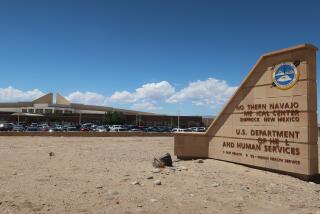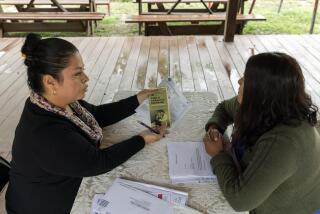Obamacare is helping more poor patients get to the doctor even as political battles continue
Reporting from Washington — Even as the Affordable Care Act remains a political flash point, new research shows it is dramatically improving poor patients’ access to medical care in states that have used the law to expand their Medicaid safety net.
After just two years of expanded coverage, patients in expansion states are going to the doctor more frequently and having less trouble paying for it.
At the same time, the experience in those states suggests better access will ultimately improve patients’ health, as patients get more regular checkups and seek care for chronic illnesses such diabetes and heart disease.
“The effects of expanding coverage will be an unfolding story over time,” said Dr. Benjamin Sommers, lead author of the study, published in the journal JAMA Internal Medicine.
See the most-read stories in National News this hour
“But we are starting to see the kind of broad-based improvements that we would expect with better access.”
The health law, often called Obamacare, nevertheless continues to be a major point of dispute in national politics, as it has been since it passed in 2010. And Republican politicians in many red states still oppose Medicaid expansion, arguing that the program is unaffordable and ineffective,.
GOP presidential nominee Donald Trump has pledged to repeal the law. He has offered little indication how he would replace the expanded safety net.
Democratic nominee Hillary Clinton, by contrast, has pledged to build on the existing law. At her nominating convention last month in Philadelphia, Democrats embraced the law more overtly than they have done in previous campaigns.
That reflects a view by some Democratic strategists that opposition to the law, while still strong among core Republicans, has waned among other voters, and that the added coverage can mobilize support, particularly among low-income and minority voters..
Medicaid is a key pillar of the law’s program for guaranteeing health coverage and has helped drive a historic drop in the nation’s uninsured rate. Nationwide surveys suggest at least 20 million previously uninsured Americans have gained coverage since 2014.
The law makes hundreds of billions of dollars of federal aid available to states to extend Medicaid coverage to poor adults, a population that had been largely excluded from the government safety net program.
Medicaid eligibility historically was limited to certain vulnerable populations, including low-income children, pregnant women, people with disabilities and the elderly.
The number of states that have expanded Medicaid under the law has slowly increased to 31, the most recent being Louisiana, where state officials have labored to keep up as more than 250,000 people have enrolled in the coverage since June.
But continued GOP opposition has left nearly 3 million low-income Americans without health insurance in the 19 states that haven’t expanded Medicaid, according to an analysis by the nonprofit Kaiser Family Foundation.
That is already having a profound effect, according to the new JAMA study, which builds on growing evidence showing a widening divide between states that are expanding access and those that aren’t.
That shouldn’t come as a surprise, said Judy Solomon, a healthcare expert at the Center on Budget and Policy Priorities, a left-leaning Washington think tank.
“People haven’t had the ability to deal with their health,” she said. “So, when you look at what people are doing when they get the coverage, you see they are getting medical care…. The sad thing is that in states that have not expanded, you see that same hunger for coverage. People just aren’t getting it.”
Sommers and other researchers at Harvard University have been tracking the effect of Medicaid expansion by surveying some 9,000 poor residents in Arkansas and Kentucky, both of which expanded Medicaid eligibility, and in Texas, which has rejected the expansion.
In Arkansas and Kentucky, the share of poor adults without health insurance plummeted between 2013 and 2015, from more than 40% in both states to 14% in Arkansas and less than 9% in Kentucky.
In Texas, by contrast, the uninsured rate dropped only from 39% to 32%. Although Texas has not expanded Medicaid, state residents have been able to buy health insurance on the new insurance marketplaces that were also created by the law.
The new coverage in Arkansas and Kentucky dramatically improved poor patients’ access to care and relieved financial strains, the surveys show.
The share of patients in the two states who had trouble paying medical bills fell more than 11 percentage points between 2013 and 2015, while in Texas, more patients reported medical bill problems in 2015 than in 2013.
Survey data from 2014 showed those improvements after just one year of the Medicaid expansion in Arkansas and Kentucky.
But with another year of data, researchers noted more evidence that the improved access is also allowing more poor patients to seek recommended medical care.
In 2015, for example, nearly 55% of low-income Arkansas residents reported having a check-up in the past year, up from 45% in 2013.
In Kentucky, the percentage surged even more, from 46% to nearly 60%.
There were similar improvements among chronically ill patients who reported getting regular care, with the share in Arkansas jumping from 62% to 74% and in Kentucky from 69% to 79%.
By contrast, fewer low-income Texans reported getting a checkup or getting regular care for a chronic condition in 2015, compared with 2013.
The authors cautioned that the increased use of recommended care does not guarantee these patients will get healthier in the future.
Sommers called the findings “encouraging,” noting that improved measures of health – such as lower cholesterol or blood pressure – may be a few years off. “These outcomes take more time to show up,” he said.
Nonetheless, the study’s authors say, the results from Arkansas and Kentucky should help inform debate in other states.
“Our study suggests that coverage expansion … can produce substantial benefits for low-income populations,” they concluded.
Whether the new data will have any effect on the political debate remains unclear.
“Unfortunately, I think a lot of people who oppose the expansion have bought into these cliches that Medicaid is a terrible program and people get bad coverage,” said Frank Thompson, an authority on Medicaid at Rutgers University.
“There is just no question that Medicaid does a heck of a lot of good for people.”
Twitter: @noamlevey
ALSO
Obama administration moves to block health insurance mega-mergers
Still no Obamacare alternative from House Republicans, five years on
Fighting Obamacare, many red states find fewer tools to fight opioid addiction epidemic
UPDATES:
2:15 p.m.: The story was updated with additional detail.
The story was originally published at 11 a.m.
More to Read
Sign up for Essential California
The most important California stories and recommendations in your inbox every morning.
You may occasionally receive promotional content from the Los Angeles Times.











